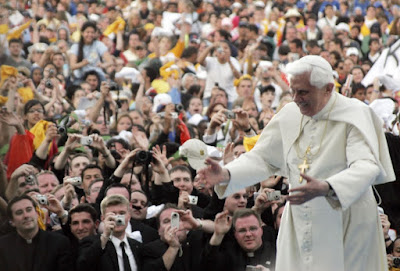The Ratzinger Revolution.
Pope Emeritus Benedict XVI turned ninety on Easter Sunday, marking his birthday today with a quiet celebration in Rome. Pope Benedict has had a profound impact on my life as a Catholic, as a Jesuit, and as a priest, and I proudly identify as a member of the Benedict Generation even though I came of age and entered the Jesuits before he became pope. Pope Benedict's decision to vacate the Chair of St. Peter was a spiritual trauma from which I have not yet fully recovered, and the efforts that some have undertaken to dismiss or to undermine his legacy have often rubbed salt in the wound.
Given the pain that the abdication of Pope Benedict XVI still provokes, I took some comfort from an article by Tracey Rowland published on Good Friday in the Catholic Herald. Looking at "the brave new world of 21st-century Catholicism," Rowland argues that Ratzinger's theological output "will form a treasury to be mined by future generations trying to piece together elements of a fragmented Christian culture." According to Rowland, Ratzinger's work could serve as a precious resource for young people trying to get their bearings in societies increasingly divorced from their roots:
Today we cannot even presume the existence of the baptismal certificate. Members of the millennial generation find themselves in a situation where they have rarely experienced a fully functional Christian social milieu. To find out about Christianity, especially the Catholic version of it, they watch documentaries and films. They interrogate older Catholics, and google information about the saints, liturgies and cultural practices.Having encountered Ratzinger and some of his interlocutors, from John Henry Newman to Henri de Lubac, Rowland hopes that "a generation tired of the banality of cheap intimacy and nominalism gone mad may rediscover the buried capital of a civilisation built on the belief that the Incarnation really did happen. They may also gradually learn to distinguish a secularised Christianity that hooked itself up to whatever zeitgeist wafted along from the real mysteries celebrated in something called the old Christian calendar." I hope and pray that she is right, and that future generations who did not know the pontificate of Benedict XVI at first hand might come to know and appreciate Joseph Ratzinger through his writings. AMDG.
The cultural capital that should follow as a natural endowment upon their baptism has been frittered away, buried and in some cases even suppressed by previous generations. They are like archaeologists. They discover fragments of the faith which they find attractive and then they try to work out where the fragment once fitted into a Catholic mental universe.
When a new generation arises in full rebellion from the social experiments of the contemporary era, craving a human ecology that respects both God and nature, and wanting to be something more than rootless cosmopolitans, Ratzinger’s publications will serve as Harry Potter-style Portkeys, giving creative young rebels access to the missing cultural capital – indeed, access to what Ratzinger calls the memoria Ecclesiae.


1 Comments:
I stumbled upon Dr. Rowland's book on the theology of Benedict XVI in my public library of all places. I'd recommend it highly to anyone wanting a good intro to Benedict/Ratzinger's main topics of reflection.
Happy Easter to you! Surrexit Dominus et apparuit Simoni Petro! Alleluia!
Post a Comment
<< Home